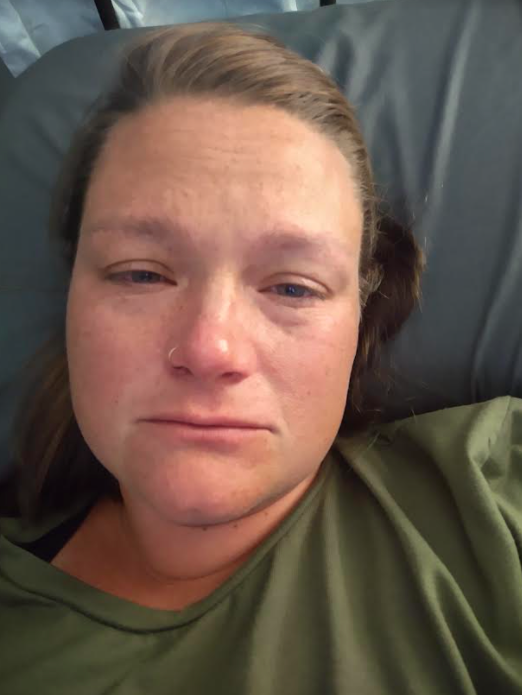I remember June 4th, 2016 with great clarity. It was the appointment we’d simultaneously hoped for and dreaded for years.
Between my husband and I, we have over 30 years experience working with people with disabilities. We had known for about three years that our son was showing some major red flags for behavior disorders but few doctors will hear your cries for help before a child is four years old.
I didn’t sleep for days before the doctor’s appointment. I cried at the nurse’s questions before the doctor even came into our examination room. Though all of our son’s behaviors had been daily struggles for us for years, this was the first time I had ever felt heard.
Although our son has collected three more diagnosis since that day, the original assignment of a label to our child was heavy. It gave validation to our fears and concerns while also reminding us that we would have a rough journey ahead…and so would our boy.
As a public school teacher, I know the weight that tiny symbol on the class roster can carry for a student. Some educators will completely write a child off even before meeting them and learning of their gifts and strengths.
Even though I knew our son had legitimate needs for medication and that his diagnosis was a brain issue, I still felt tremendous guilt. “Was there something I did wrong while I was pregnant?” “Is this genetic?” “Did he get this from me?” “Should I have gotten him help sooner?”
The playlist of parenting wrongdoing was never-ending.
But here is the full truth: It isn’t your fault. It isn’t their fault. This is the child you were given and the child you were chosen to raise.
Now that we have a diagnosis, what do we do?
Give Yourself Time To Grieve
While you aren’t losing a child as some would say, you do need to allow yourself the room to grieve the loss of the life you thought your child would have. Depending on the diagnosis, some kids might be non-verbal or less expressive, some may have trouble making or keeping friends, and others may have diagnosis that lend themselves to a higher rate of instances of trouble with the law or addiction. This is a reality for parenting extreme children and it is okay to give yourself the freedom to feel this loss.
While I still pray fervently for my son’s future and still hold very high expectations for him, I am also realistic about the challenges he already has as a six-year-old and that he may continue to have until he learns how to properly manage his emotions and cope with his behaviors.
Consult A Trusted Friend
This is crucial. I have said it before and I will continue to say that building your ‘tribe’, as I call it, may be the most important thing you do as a parent, especially a parent of a child with special needs. Our boy can be physically and verbally aggressive. He has meltdowns in public. His behaviors sometimes prevent us from basic events and family functions. This can be a major source of contention for any family dynamic.
Relying on trusted friends is the missing link when others may be too close to your situation or just not ‘get’ what you are dealing with each day. My tribe is my go-to for the emotions I am flooded with following a meltdown from my son. They are who I send hilariously inappropriate memes to because anyone else would think I am a bad person, but they know if I don’t laugh, I’ll cry. They will answer an SOS text at 3am. These are my people and they are my lifeline.
Do Your Research and Forgive Yourself
As a nerd at heart, I find comfort in research. Whether I am scouring medical journals for advances in medication or aggressively pinning from Pinterest new strategies for discipline or behavior techniques, I am always learning. Parents, do not take the word of one doctor as law. Read for yourself what is involved in your child’s diagnosis. This will help you to empathize with your child as you begin to understand that their diagnosis is a real disorder of the brain or body.
I get it. It is insanely frustrating when they lose control. However, when you realize that it isn’t just a show (at least not always), it may help you calm down before you discipline.
Once you have begun to understand where their little minds are coming from, you can begin to forgive yourself.
I am sure parts of my son’s anxiety are hereditary and thus come from me. However, I did not choose to pass that on to him any more than I chose to give thick thighs to my beautiful little girl. My obsessive (or intrusive) thoughts, have trickled down to our son as well, but I didn’t wish that on him. I had to go through a period of time where I spent many sleepless nights blaming myself, shaming myself, and beating myself up for things that were completely beyond my control. I had to forgive myself in order to move forward.
Focus On the Positives
Yes, my son has trouble managing his emotions. He is constantly moving and fidgeting and he cannot focus on a task without medication management. However, he is also incredibly smart, engineering-minded, and a brilliant little (almost) blue belt in karate. He is a gift athlete and loves to build things with his hands.
I will not let my child be defined by the symbol next to his name on a class roster. He is so much more than that and that is what I will choose to focus on and build up.
I will tell my child every day that I am proud of him. I will encourage his strengths and support him in his weaknesses. I will research and find new strategies to help him learn to cope. And I will remind him each and every day that I am immensely proud that God chose me to be his mama.
Parents, raising kids is next-level commitment. It is as hard as it is joy-filled. Give yourselves some credit because no one asked for the kids they got, but here we are, killing it!
Are you raising or teaching an extreme child too? Don’t miss THIS eCourse with practical steps to success while saving your sanity.
Need support? Click HERE to join our completely private Facebook community where other moms ‘get it’.


Our big appt for our son is coming up. I do feel the hope and dread combined. Your writing helps reassure me that we can handle whatever comes. It has never been easy, so no unrealistic expectations of easy solutions. But advocating for our son and family feels good. Thanks, Brynn.
I’ll be praying for you. This is a huge day and I know the weight of it too well. You can do this, mama!
This hits so close to home. I have three grown children, 25, 21, and 19, and one 3 year old. Even considering that I’ve been down the path of dual exeptionalities before (ADHD/GT/ASD) between my three oldest, I feel so overwhelmed and underprepared for my youngest. I, too, am a school teacher (though SAHM due to circumstances now). He’s definitely dealing with some SPD and anxiety, but his anger and inability to self-regulate are troublesome. I know what it looks like at the school level and how little in available or appropriate for kiddos like him. I don’t relish the idea of more labels that will cloud people’s perception of this smart, interesting little boy. However, being heard, as you put it, would definitely help me accept that I’m not crazy. Much love to you for sharing.
How do I talk to someone about this I have four kids
Join my private FB extreme parenting community. You can literally ask anything, it has clinicians, docs, specialist, etc and it is TOTALLY private so no one can see what you are asking or commenting. It is my lifeline because the main page was WAY too big and I needed a space safe for me to vent to other moms who didn’t judge me!! We are here for you mama!